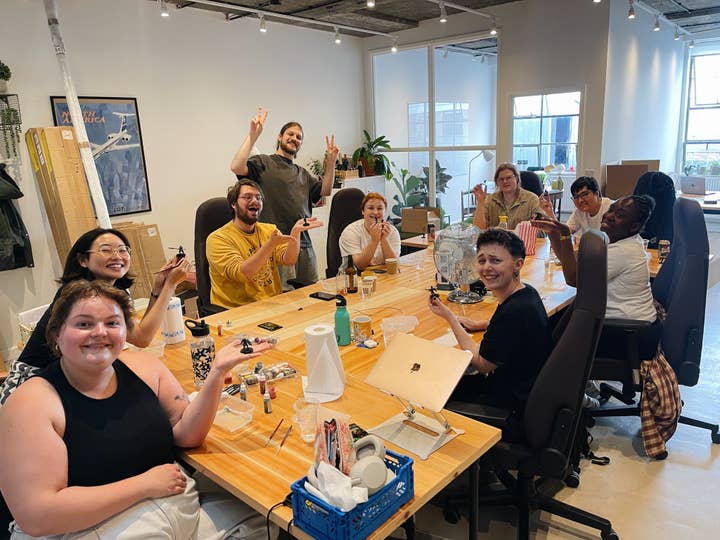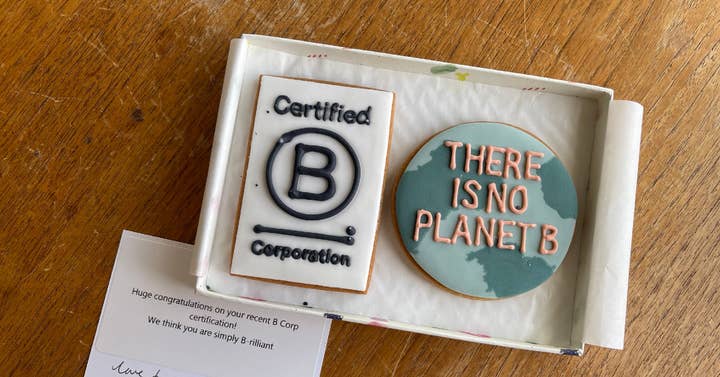How to make your company economically sustainable
Creative agency Yrs Truly's founder MJ Widomska tells us how businesses can ensure long-term success by applying sustainability beyond being environmentally responsible
Sign up for the GI Daily here to get the biggest news straight to your inbox
Many businesses define sustainability as ecological. In 2021, we invited panellists to talk about ways in which game studios and publishers can be more sustainable, for example by reducing their carbon footprint and raising awareness for climate change among their audiences.
At gaming marketing agency Yrs Truly, sustainability takes on other forms besides, in order to show that truly every company in the gaming industry can be sustainable, whether they produce physical goods or not.
"It's a little frustrating to see people think of sustainability only in terms of environmental impact"
"It's a little bit frustrating to see people think of sustainability only in terms of environmental impact, because many companies in games then go ‘Oh well, I don't produce anything physical so this doesn't apply to me'," Yrs Truly founder MJ Widomska tells the GamesIndustry.biz Academy.
"A sustainable business is a business that is run so it can sustain for a long time."
Widomska has broken sustainability down into three pillars – economic policy, society and environmental impact – and argues that many companies in the gaming industry could do more to be economically sustainable in particular by creating a company that is financially viable and secure in the long term.
Don't take every opportunity for growth
"One of the most controversial things I've said as part of my talks is that if you are taking every growth opportunity available you are probably not sustainable," she says. "If you take an opportunity to hire people but don't have the structures in place to sustain a team of a bigger size, you are not working sustainably. People get hired for a year on a project and then get fired. It's a horrible policy, but it happens a lot in games."
According to Widomska, sustainable hiring reduces the financial insecurities surrounding short-term contracts, it also allows workers to settle and become part of local communities, all elements that allow people to do their best work.
"Sustainability means creating good products and environments by not spreading yourself thin and focusing on what will work," she says. "I believe very strongly that if you aren't working sustainably, you're wasting resources – you're going to end up with a game that people won't want to interact with, your team will be stressed, and ultimately, your work will go to waste."
Identify the right growth opportunities for you
In order to know the right time for growth, Widomska suggests taking a look at your company in its entirety, from the structure of your teams and your workers' skillsets and tasks to your management skills and your company culture. Taking all of these factors into account, you then need to decide whether injecting additional people will help without harming the existing structures.
"It's natural to want to take opportunities to grow, but growth is a process that should ideally happen over years," Widomska explains. "How many startups do we see that get massive funding, hire loads of people, only to collapse a few years later? Maybe you have the opportunity to double your team every year, but it's extremely difficult to do that and keep the same ethics and morals, or make sure that the work is still as good and that people still care about your company."
Don't give into the temptation to grow
Widomska has experience with making the difficult decision of whether or not to grow when it comes to her own agency, Yrs Truly.
"If you are taking every growth opportunity available you are probably not sustainable"
"We've been given the opportunity to work with a really big client, only to unfortunately realise that we would have to hire, and hire a few people at once, at that," she says. "There's 11 of us, so for a company of our size to hire three more people means a 25%increase. We don't have the financial stability to do that, we want to set a few months of our operating costs a year aside to have something to fall back on, because I don't want to have to fire all these people when a big client leaves."
Growth is expected under capitalism, especially of venture capital-funded companies, however, an expectation that Widomska has no love for and which to her is actively hindering sustainability.
"There is no example of exponential growth in nature, so there is no basis for us to believe this approach actually works," she says. "A lot of this growth is artificially created by this circle of hiring people, running into trouble, firing people, doing better, hiring people again."
This way, Widomska stresses, companies don't actually grow – instead, they frequently cycled back to their pre-growth state before making another attempt.
Have a positive societal impact
Running a company with economical sustainability in mind also means creating an ideal environment for your workers. Workers who are permanently worried about losing their job are unable to produce their best work. Instead, you need to create a company culture that allows your employees to do their best work, not only because you benefit from good work economically, but because your workers aren't an infinite resource.
"Working sustainably means utilising resources that can be renewed, or not compromising the future generation's ability to meet their needs by meeting yours first," Widomska says. "You have to have the desire to pay people fairly and to make a societal impact."
While by Widomska's own admission, being aware of games' societal impact and using it for good is extremely important, that doesn't mean that every company has to get involved in large projects to gain media attention and have the biggest possible impact. Instead, she suggests that societal impact also means positively impacting workers and their communities.
"Working sustainably means utilising resources that can be renewed, or not compromising the future generation’s ability to meet their needs by meeting yours first"
"We have an office that everyone lives very close to. I understand I have to pay people more by wanting them to live in London and in the local area. This means their workplace feels like an extension of their local community," she says. "We avoid outside catering for example, in order to not cause more traffic in the local area and to encourage buying your lunch locally. We talk to local schools, we support local charities, we will embed ourselves with the local businesses."
Widomska also encourages diversity on every level of her business, from creating an inclusive work environment to only working with inclusive creators. Additionally, she describes something similar to a code of ethics that informs your company culture and your products.
"I don't think it's useful to expect a company to make sure every single game has an environmentally friendly message or something like that, but you could be thinking about whether you are creating something meaningful, however you define meaningful," she says.
"Imagine putting a lot of resources into food that no one wants to eat. For games this means you have to make games that people want to play, and you can't do that if you don't keep an eye on your resources or workers are overworked or management isn't good."
Of course there is no failsafe way to make games that people want to play, but for Widomska, sustainability on every level of the business will inevitably lead to good games, since creatives on every level will be empowered to do their best work.

Yrs Truly has also successfully implemented a four-day work week.
"We've seen the results from the four-day work week pilot, and how 92% percent of companies that tried it then stuck with it, there really were no arguments against it," Widomska says.
The agency doesn't treat Friday like a regular day off, however. Instead, while employees don't actively engage with work, they stay in a position that would allow them to work if necessary, effectively staying on call.
"We don't see Friday as an equal day to Saturday or Sunday, because on Fridays still a lot of the people in our industry work," Widomska explains. "I need people to keep checking their messages, so I can assemble the team if necessary."
Widomska stresses that she hasn't had to call the team into the office on a Friday yet, but she maintains that keeping the option open helps clients as well as her team feel supported.
Avoid reputational damage via diversity and sustainability
Companies that don't work in sustainable ways also increasingly do damage to their reputation, according to Widomska.
"There are studios that continue to make games [unsustainably] but so many people have left those studios that it no longer feels like the game is made by the same studio."
Audiences are now much more aware of workplace abuse in the gaming industry and efforts to unionise, and while most game developers are in favour of unionisation according to the latest State of the Game Industry Survey, Widomska believes so are their audiences.

"Gen-Z and Millennials are both firmly embedded in the gaming workspace now, millennials are about to become the biggest group of consumers," she points out. "With both generations you find that they spend more money with companies whose values they agree with. Millennials as customers and workers demand better accountability from companies."
Widomska also points to figures that suggest people who play video games are more likely to be vegetarian and identify within the LGBTQ+ spectrum than the population average. They also worry more about climate change and engage politically. Engaging with causes that players care about is thus in every company's best interest.
"We now acknowledge that women play games, that people of colour play games, but instead of engaging with their interests, many companies still assume that because these people game, they have the same interests as the stereotypical gamer we've identified before," Widomska says.
"But with acknowledging a diverse audience needs to come an acknowledgement of a more diverse set of interests, too, reflected both in the games and the companies that make them. Gamers aren't passive, they care about sustainability a lot."
How to drive sustainability
To achieve more sustainability within the games industry, the concept in the way Widomska describes it likely needs to catch on more widely first.
"The one thing that could really help would be greater unionisation and legislation, as well as better understanding of sustainability from indies and publishers," she says. While efforts within legislation aren't something many companies have any kind of influence over, spreading the word and operating sustainably is a good effort for any company to undertake.
In addition to Widomska's efforts as a speaker on the topic, Yrs Truly is a certified B Corporation – a global, international certification that assesses a company's sustainability and societal impact.
"Gamers aren’t passive, they care about sustainability a lot"
Widomska also believes that independent game studios could be the biggest drivers of change. Larger companies often have to factor in the demands of shareholders, a large part of whom may not have any experience with gaming culture. Indie game studios, on the other hand, especially ‘AAA indies', studios led by industry veterans, are in the best position to drive the change.
"Those that have greater autonomy and aren't beholden to people who don't care about games, and they can build change much faster, such as offering the four-day work week. If you make sustainable products from the get-go, you show others that it can be done," she says, emphasising that while everyone's efforts matter, a studio that receives publicity and attention from players curious about a veteran's next projects are in a better position to promote sustainability than a small marketing agency such as Yrs Truly.
One thing Widomska knows for sure: by identifying the needs of workers and audiences and meeting audiences where they're at, the gaming industry will be better off as a whole.
More GamesIndustry.biz Academy guides to Working in Games
Our guides to working in games cover various perspectives, from hiring to retention, to landing the job of your dream or creating the right company culture:
Interview by James Batchelor

